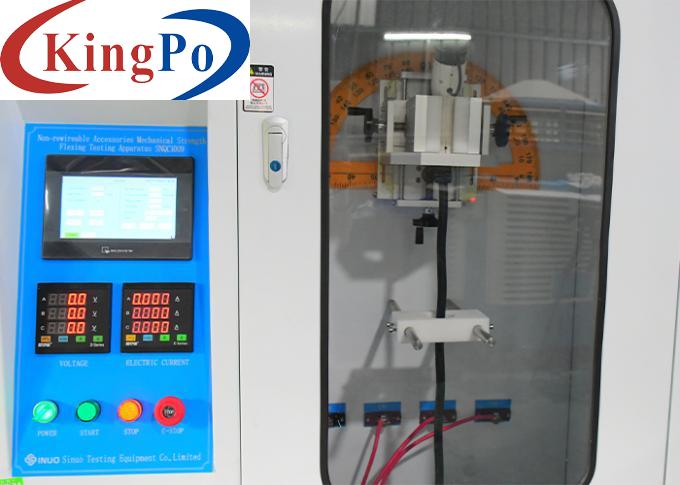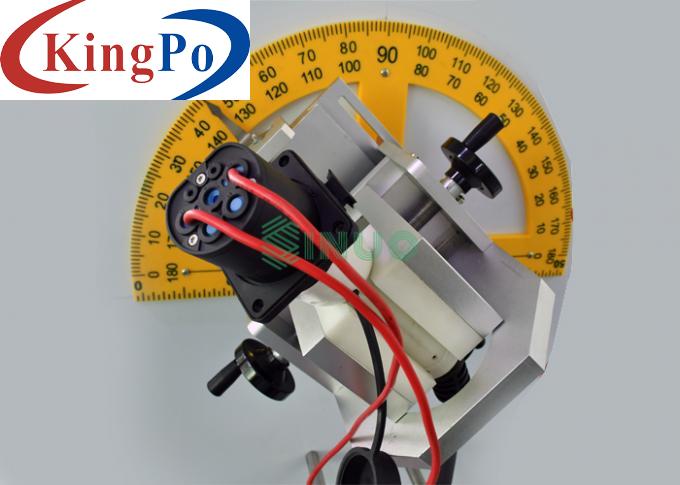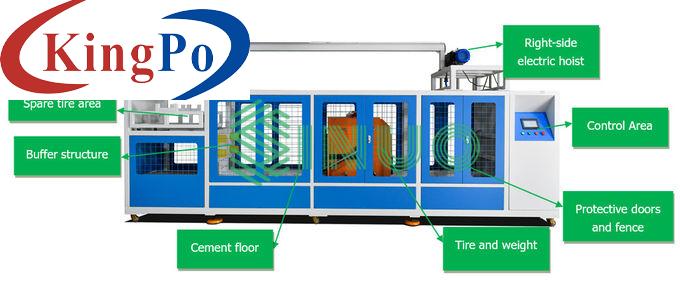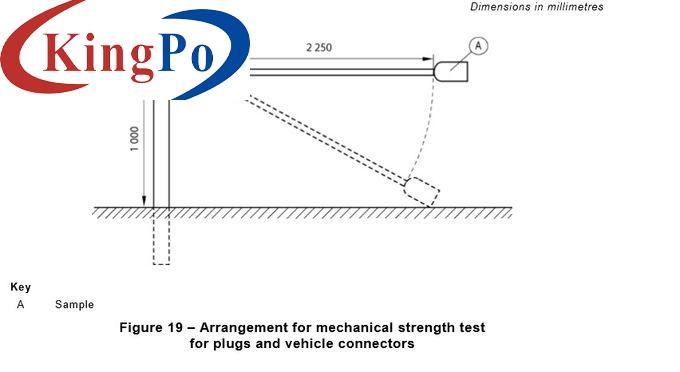Products

IEC 62196-1 Non-rewireable Accessories Mechanical Strength Flexing Testing Apparatus For EV
Products Description
IEC 62196-1 Non-rewireable Accessories Mechanical Strength Flexing Testing Apparatus for EV
Product Information:
The flexibility testing apparatus is designed and manufactured according to requirements of IEC62196-1: 2022 clause 26.4 table 14, IEC60309-1: 2012 clause 24.4 figure 9, etc. It is used to process the mechanical load flexing test of the vehicle plugs, socket-outlets and couplers non-rewireable accessories.
The equipment adopts PLC control and operated by 7-inch colour human-machine interface, uses a servo motor to control the flexing angle. The flexing angle, flexing speed and the test cycles can be preset on touch screen. The test is automatically carried out according to the set parameters. When the test times reach the preset number of test times, the device automatically stops and gives the test completion signal prompt. The test equipment has the advantages of high-precision digital display, high-efficiency digital frequency conversion, precise speed adjustment, six-digit memory setting, multi-function modular fixture, rotating center centering measuring tool, and built-in load which can supply load voltage to test sample during test.
Features:
A mechanical strength flexing testing apparatus for non-rewirable accessories is a specialized equipment used to assess the mechanical durability and robustness of non-rewirable electrical accessories such as plugs, sockets, connectors, or power cords. This type of testing is conducted to evaluate the ability of these accessories to withstand repeated bending, twisting, and flexing movements that may occur during normal use or handling. Here are the key features and functions typically associated with such a testing apparatus:
Test Setup: The apparatus consists of a test setup specifically designed to subject the non-rewirable accessory to controlled mechanical stress. This setup typically includes fixtures, clamps, or holders that securely hold the accessory in place while allowing for controlled bending or flexing movements.
Flexing Mechanism: The apparatus incorporates a flexing mechanism that applies repetitive bending or flexing movements to the non-rewirable accessory. This mechanism may involve motorized arms or rollers that repeatedly bend or twist the accessory according to the specified test parameters.
Flexing Parameters: The apparatus allows for precise control and adjustment of test parameters such as the number of flexing cycles, flexing speed, flexing angle, and the duration of the test. These parameters can be set according to relevant industry standards or specific testing requirements.
Force Measurement: Some testing apparatuses include force measurement capabilities to assess the mechanical strength of the accessory during flexing. This may involve load cells or force sensors that measure the forces applied to the accessory, allowing for the evaluation of its resistance to deformation or breakage.
Visual Inspection: The apparatus provides provisions for visual inspection of the accessory during and after the flexing test. Observations can be made to check for any signs of damage, such as cracks, fractures, or changes in the accessory's physical integrity.
Compliance with Standards: A mechanical strength flexing testing apparatus is designed to comply with relevant industry standards, such as those specified by national or international organizations like the International Electrotechnical Commission (IEC) or the Underwriters Laboratories (UL). Compliance ensures that the testing process follows established guidelines and provides reliable and comparable results.
Mechanical strength flexing testing apparatuses are commonly used by manufacturers, testing laboratories, or certification bodies to ensure that non-rewirable electrical accessories meet the required mechanical durability standards. By subjecting the accessories to repetitive bending and flexing movements, these tests help assess their ability to withstand typical usage conditions, reducing the risk of mechanical failure or damage during operation.
Technical parameters:
Built-in, with adjustable phase voltage between conductors 0-250V and current AC0-400A adjustable
Note: for load >400A, please use an external power source
Test Station
Single
Electrical Control Method
PLC intelligent integrated control, 7-inch humanized touch interface operation
Drive Mode
Servo motor
Sample Clamping Method
Mechanical clamping, the position of clamping point is adjustable
Flexing Angle
0-360° can be adjusted freely (default 90°, 45°on either side of the vertical)
Flexing Rate
0-60 cycles / min, can be preset
Flexing Cycles
0~999999 can be preset, default 20000 cycles
Load Weights
20N, 25N, 50N, 75N, 100N, 120N, 140N, 180N
Load Power
Test Judgment
Judging by the signals given when the current is conducted or not
Equipment Dimensions & Weight
L 850mm *W 800mm *H 1500mm, the whole machine is about 300Kg
Power Supply
Three phase AC380V±10%, 50Hz







